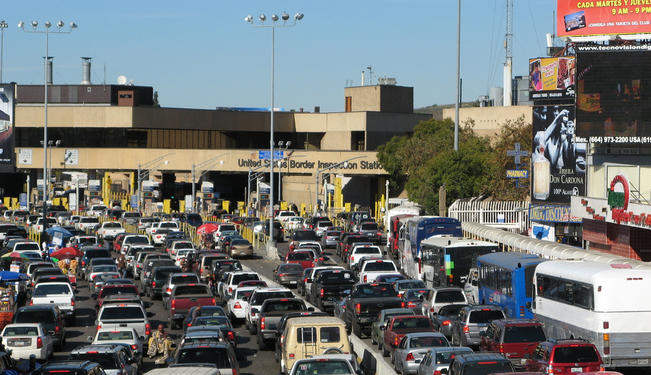As the Presidential Race heats up, Immigration Policy sways back and forth.
Almost a year ago I published an article for Fair Observer commenting on President Barack Obama’s use of the Secure Communities Program (SCOMM) which mandates local law enforcement to notify Immigration & Customs Enforcement (ICE) authorities if an undocumented migrant is in their detention. That article was in response to the State Department issuing a temporary reprieve last summer on the mass deportations which to date have forcibly deported over a million and a half undocumented migrants within the last three years. The reprieve extended primarily to ‘Dream Act’ students, victims of serious crimes, the elderly, and individuals who have young children or are expecting. In all, Secretary of Homeland Security Janet Napolitano said they would review just over 300,000 cases where tenuous deportation cases were in process. The change of policy was received with the expected futile partisanship that infects immigration debates today. My argument then as it is today, centers on the political sways of the presidential campaign season and the attempt of the Obama Administration to curry favor with the Latino voting population. Make no mistake, last summer’s temporary reprieve was a political move.
The Use of "Discretion"
There has been much action within the last year. On June 15th, ten days before the Supreme Court upheld major provisions of Arizona’s SB-1070 anti-immigrant bill, Barack Obama issued by decree a change in the country’s broken immigration policy. Citing the innocence of otherwise hard-working American youth in not having a say of where to be born, the Obama administration decided to use “discretion” instead of “amnesty” and make about 800,000 young undocumented individuals eligible for work-permits. These undocumented individuals will thus receive “deferred action” from deportation proceedings for a two-year period that will be subject to renewal. Under the mandate, individuals must be at least 16 years old and under 30 to be eligible. They need to have been brought to the U.S. before the age of 16 and live here continuously for at least five years. The policy change has been welcomed by the ‘Dreamers’ and hailed as a victory in their long struggle against a Congress that has largely been absent in the immigration debate. This new policy will not provide a pathway to citizenship or permanent residency unfortunately, but will undoubtedly be at the center of all the upcoming presidential debates about immigration.
Rejection and Support – The Trust Act
To no one’s surprise, Obama’s decree did not sit well with everyone. Almost immediately cries of foul play and illegality rang out. As states like Arizona and Alabama seek to choke out their undocumented communities, states like California seem to be taking a more sensible approach. The issue on Thursday July 5th, the California State senate overwhelmingly approved a bill called the TRUST ACT. The bill is aimed at limiting the social impact of the inefficient and costly Secure Communities program by mitigating the reach of local law enforcement official’s actions in regards to immigration detainees. The bill would prohibit local law enforcement officials from detaining an individual on the basis of an Immigration and Customs Enforcement hold after that individual becomes eligible for release from criminal custody. The bill must still pass the State Assembly and be signed off by Governor Jerry Brown to become law. The early success of the bill however, represents a significant victory for the immigrants’ rights movement and has positioned California as the “anti-Arizona” among states that suffer from a lack of action by Washington on the issue of immigration reform. If the TRUST ACT becomes law, state and county jails would be obliged to only report undocumented detainees classified as “serious” or “violent” to federal immigration authorities. As a result, migrants arrested for traffic violations or misdemeanor offenses would be far less likely to end up in removal proceedings.
Possible Effects of the Trust Act
Critics of the bill have pointed out that its passage would make the state of California a “sanctuary state” where uncommented migrants can come and break the law freely. Such criticisms miss the point however as the TRUST ACT makes no imposition on existing state detention laws, only curbs the power of local police to detain non-serious undocumented offenders. Overall, this bill would benefit local law enforcement agencies in several important ways. For example, the bill would go a long way toward restoring the mistrust toward local police that has permeated within the different U.S. undocumented migrant communities. The bill would also reduce litigation time, free up overcrowded cell space, and would all but eliminate mistaken placement detainers of U.S. citizens, which is more common than we would like to think.
Immigration Issue during the Obama Legislation
Barack Obama promised much during his first presidential campaign in regards to immigration reform. To date, his administration has deported more people in its first term than George W. Bush’s two terms. As ABC news reported in December: "Since 2009, the annual average number of deportations has approached 400,000, according to the Department of Homeland Security. That’s double the annual average during President George W. Bush’s first term and 30 percent higher than the average when he left office." The mass deportations exacted under Obama’s watch have come at a great social expense within American communities. As a result, whole nuclear families have been torn apart as heads of households never make it back home from a hard day of work. Children of parents who have been abruptly deported face a scary and uncertain future as many of them must return to their parents’ country of origin because there is no one to look after them here. What happens next is of vital importance for a large segment of an American population that is poised and ready to emerge from the shadows.
The views expressed in this article are the author's own and do not necessarily reflect Fair Observer's editorial policy.
For more than 10 years, Fair Observer has been free, fair and independent. No billionaire owns us, no advertisers control us. We are a reader-supported nonprofit. Unlike many other publications, we keep our content free for readers regardless of where they live or whether they can afford to pay. We have no paywalls and no ads.
In the post-truth era of fake news, echo chambers and filter bubbles, we publish a plurality of perspectives from around the world. Anyone can publish with us, but everyone goes through a rigorous editorial process. So, you get fact-checked, well-reasoned content instead of noise.
We publish 2,500+ voices from 90+ countries. We also conduct education and training programs
on subjects ranging from digital media and journalism to writing and critical thinking. This
doesn’t come cheap. Servers, editors, trainers and web developers cost
money.
Please consider supporting us on a regular basis as a recurring donor or a
sustaining member.
Support Fair Observer
We rely on your support for our independence, diversity and quality.
Will you support FO’s journalism?
We rely on your support for our independence, diversity and quality.






